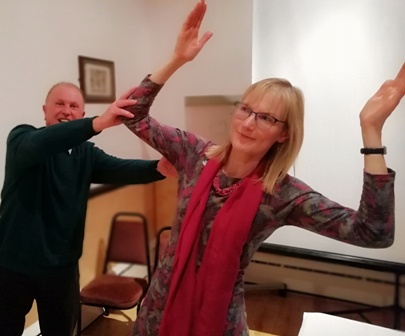
Rather than deliver a lecture when she visited the Rotary Club of Leicester Novus, Lesley Green delivered an interactive session on behalf of the Alzheimer’s Society.
First, she asked her audience to marry up two halves of 12 broken sentences to get them thinking about the five key messages of her presentation:
1 Dementia is not a natural part of ageing
2 Dementia is caused by an illness of the brain
3 Dementia is not just about losing your memory — it can affect thinking, communicating, and doing everyday tasks
4 It’s possible to live well with dementia
5 There’s more to the person than their dementia
Lesley said the brain is like a series of fairy lights and dementia can cause one or more of the lights to flicker or to fail.
Dementia Friends, she said, can help reduce fear and stigma, and can also help turn understanding into action.
Jim Gannon, who accompanied Lesley, is the co-ordinator of the Oadby Town Centre Retail Group. He gave the example of an Oadby business which had noticed that a customer living with dementia was fearful of entering the shop. The reason was that it had a black mat in the doorway which the customer was perceiving as a hole. Simply by changing the black mat for a light-coloured one, they made the shop less fearful and more welcoming for that customer.
Lesley said that living with dementia can cause behavioural changes. One lady living with dementia was seen to be constantly tap-tapping on any and every nearby surface. It was not until it was learned that she had worked at Bletchley Park, the World War II code-breaking centre, was it realised that the lady had been tapping in Morse Code. The local media became involved and local scouts, who had been studying for their Morse Code badge, went along to meet her and learn from her. The stigma was removed and the lady suddenly rose in the public esteem.
Lesley asked her audience to imagine her as a tall bookcase, with books representing memories. The most recent memories were on the top shelf. She asked Jim Gannon to push her and for her audience to visualise the newer memories represented by the books on the top shelf toppling off, while the older memories (the books on the lower shelf) remaining.
Lesley later handed out cards which several members signed committing to at least one of the five actions:
1 staying in touch with someone with dementia
2 volunteering to help with a dementia group or charity
3 campaigning for change to improve the lives of people living with dementia
4 wearing the badges given them by Lesley and talking about Dementia Friends
5 carrying out a personal action.
Lesley and Jim were formally thanked by Rotary member Fraser Robson who volunteers with both Lesley and Jim at Oadby Food Bank.


